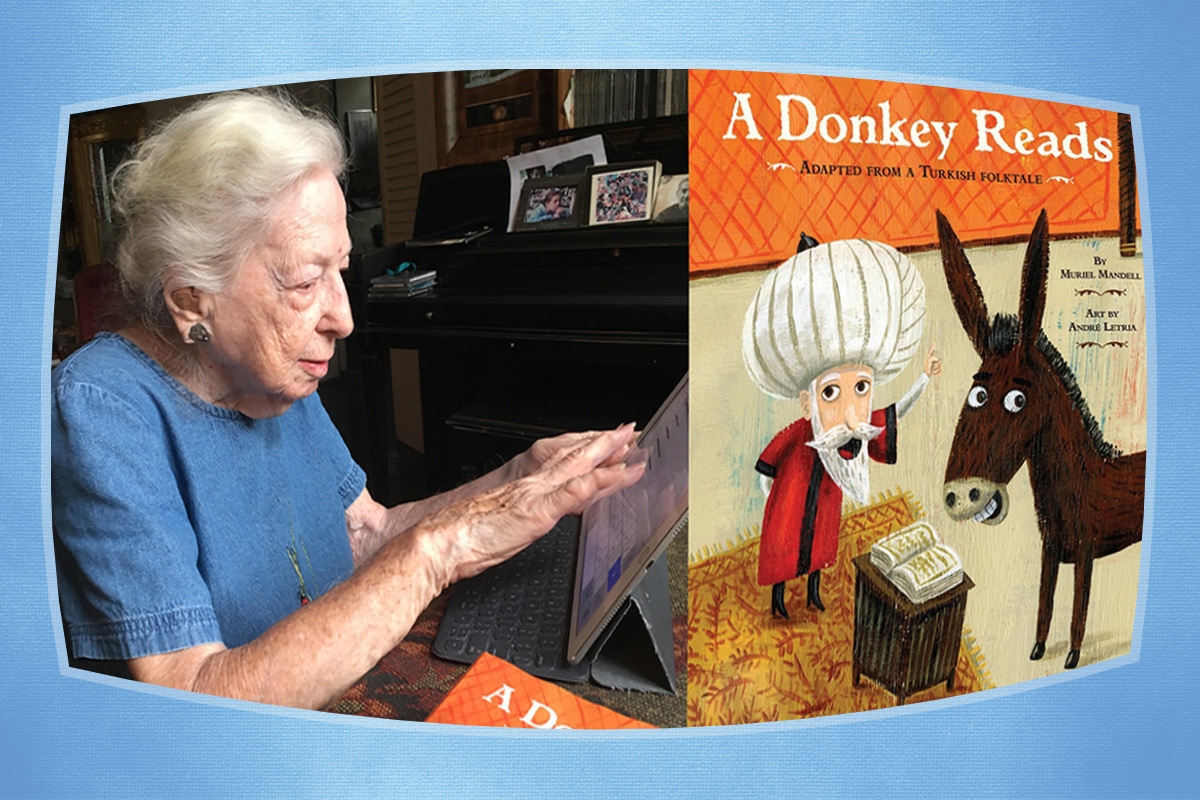This article was originally published in the New York Jewish Week via JTA.
Muriel Mandell shows few signs of slowing down as she nears her 100th birthday on Aug. 19.
The former wartime reporter-turned children’s book author-turned tech-savvy senior continues to lead a remarkably active life, as a reporter learned while visiting her apartment recently in Manhattan’s Greenwich Village.
She’s still reviewing children’s books and taking classes. And as a founder of SeniorTechNYC at the Marlene Meyerson JCC Manhattan and its predecessor, the SeniorNet Learning Center, she teaches classes in animation, photo editing and Microsoft Word. During the pandemic, she has continued teaching the classes on Zoom.
Mandell also achieved a bit of fame in January when she received her first COVID shot at the Jacob Javits Center on the first day the Manhattan venue opened as a mass vaccination site. She was approached by the public broadcaster WNYC and The Associated Press, and her picture appeared in newspapers and on websites across the country, including the New York theater blog run by her son Jonathan.
Of course, the pandemic was anything but easy for Mandell. She was unable to get too close to family members, including her granddaughter, before vaccinations became available.
Mandell, a Manhattan native, lived in Queens and Brooklyn before moving to Paterson, New Jersey, with her family. She attended Eastside High School there, and as a senior was selected by teachers as its representative for the Paterson Morning Call newspaper.
“I was paid 3 cents a word, and I made as much as $3 a week,” she recalled.
Upon applying for college, Mandell sat for the Brooklyn College entrance exam — only to be told that she had already been accepted before spilling the bottle of ink she was supposed to use for the test.
“Of course I worked on the newspaper there,” she said.
After college, she enrolled at Columbia University’s Graduate School of Journalism before moving to Washington, D.C. There, she worked for Kveller’s partner site, the Jewish Telegraphic Agency, and its offshoot, the Overseas News Agency, which was formed during World War II. Her byline then was Muriel Levin.
“I covered everything — the State Department, the White House, the Pentagon, the Senate, the House of Representatives, the works,” she said.
In a March 1944 dispatch, Mandell reported on a visit to the White House by Rabbis Stephen S. Wise and Abba Hillel Silver. The two leading Zionists had been assured by President Franklin D. Roosevelt that he did not approve of the White Paper, the British policy limiting Jewish immigration to Palestine.
Asked about the dire situation for European Jews during World War II, as well as Roosevelt’s response to the Holocaust, she said, “We knew and we didn’t know — it was a combination.” Although JTA provided the first and sometimes only reports on the unfolding genocide, “it took years before you really realized what was really happening.”
Mandell does not consider her role as a woman journalist particularly groundbreaking — “there were a bunch of us,” she said, of female reporters in the 1940s. But after a couple of years, she married and quit that post, “maybe stupidly,” she said with a chuckle. She followed her husband back to the New York area, becoming a police reporter at the Long Branch Record on the Jersey Shore before later working as a publicist.

Muriel Mandel leaves the Javits Center in New York City after becoming one of the first people to receive the COVID-19 shot at the mass vaccination site, Jan. 13, 2021. (Spencer Platt/Getty Images)
After her two sons went off to college, “I went into teaching because my writing was not making a lot of money,” she said. “And so I taught for a lot of years, actually.”
When she retired from teaching, Mandell turned her focus to writing children’s books. Among her dozen-plus titles are the fictional “A Donkey Reads” and “Jonathan’s Sparrow,” as well as nonfiction books designed to spark curiosity such as “Fantastic Book of Logic Puzzles,” “365 Simple Science Experiments with Everyday Materials” and “Make Your Own Musical Instruments.”
Mandell is still a member of the Bank Street College of Education Children’s Book Committee, staying up on current children’s literature and contributing reviews to its annual collection of best children’s books. “I read children’s books ’til they come out of my ears,” she said.
Mandell became computer savvy in 1994 after her husband passed away, and through the international organization SeniorNet acquired computer literacy skills to the point where she was able to educate others through the JCC. “I’ve been teaching computers ever since,” she said.
In May, she received a “16 over 61” award from the JCC, given to those who display “the creativity, leadership, and initiative of older adults who exemplify our collective values.”
As if that were not enough, her children’s writing found a new platform: digital apps. “When I was 90 years old, for the first time I learned what an app was, and I wrote about 50 stories — adaptions mostly, but some originals,” she said. Her work can be found on a children’s app known as FarFaria (a play on “far, far away”).
Mandell a strong opinion about the current market for Jewish children’s books: With the preponderance of titles that focus on the Holocaust or Anne Frank, “there aren’t enough about the rituals that are positive and how the Jewish family exists,” she said. “Not enough of that.”
As for her own Jewish identity, Mandell uses the word “cultural” to describe herself. “I’m proud of being a Jew,” she said. “I wish I knew more … but my background is limited and I know it.”
Asked about the secrets of longevity, she focused on the quality of life, not the quantity of years. Recognizing the challenges of old age, Mandell said, “You don’t want to just take up space. You want to have something to contribute, otherwise why do you still exist? So it’s tough.”
She continues to enrich herself, taking United Federation of Teachers-sponsored classes for retirees, including playwriting, Spanish and watercolors. “You keep busy,” she said.








